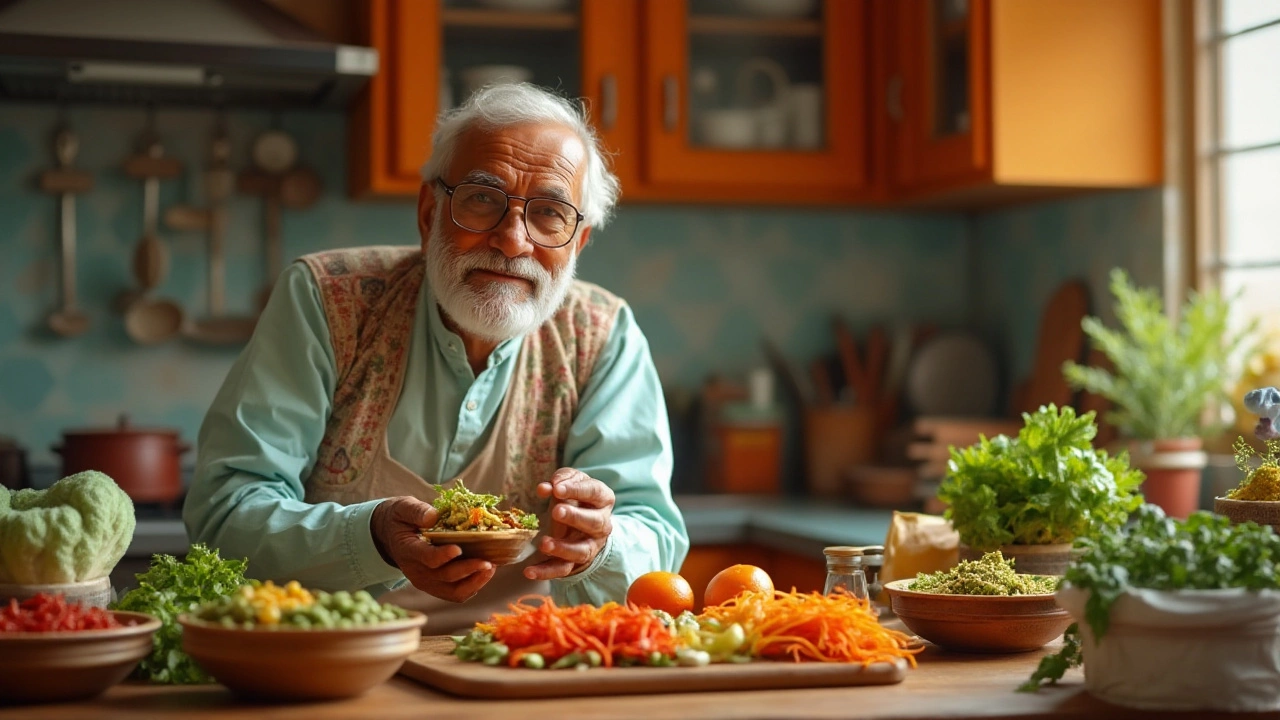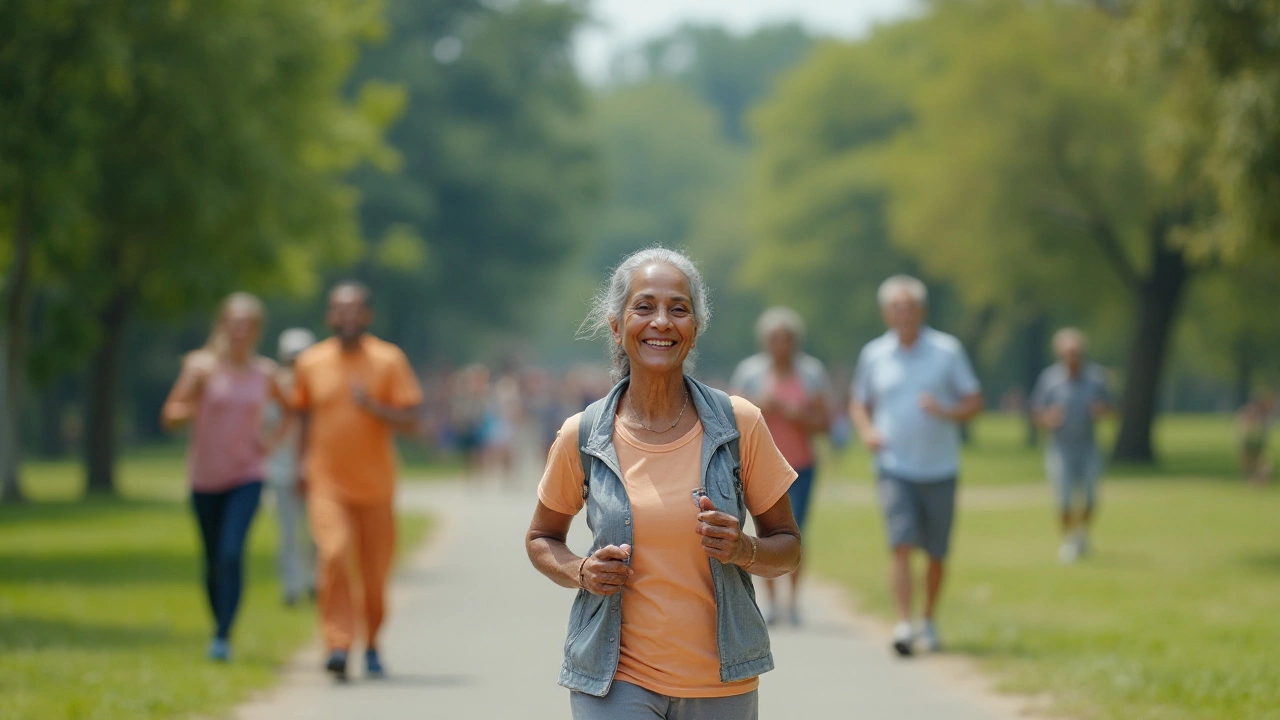Reaching your 50s brings a new perspective on health and wellness, and losing weight can become a more pressing issue. It's no secret that metabolism changes with age, making weight loss after 50 different from earlier years. However, with the right approach, shedding those 20 pounds doesn't have to be daunting.
In this guide, we’ll delve into practical tips and strategies to help you lose weight effectively after 50. You'll discover the importance of a balanced diet, suitable exercise routines, and possibly enlisting the aid of a weight loss clinic. Let's navigate this journey to a healthier you without the jargon or complication.
- Understanding Weight Loss After 50
- Dietary Changes for Effective Weight Loss
- The Role of Exercise and Physical Activity
- How Weight Loss Clinics Can Help
- Tips for Maintaining Weight Loss
Understanding Weight Loss After 50
Stepping into our 50s comes with a host of changes, both welcomed and otherwise, and weight management becomes an entirely different game. One of the key transformations is the slowdown of metabolism. This creeping deceleration means our bodies don't burn calories as quickly as they once did, making weight loss after 50 quite the challenge. Muscles tend to shrink, too, unless regularly used and maintained, further dipping into our metabolic rates. Pair this with a typically more sedentary lifestyle, and it's easier to understand why balancing weight gains importance as we age.
Hormones also play a mischievous role here. For women, menopause marks a phase of significant hormonal shifts, with a drop in estrogen levels often leading to weight gain, especially around the abdomen. Men, too, aren't free from hormone-related weight changes, as testosterone levels gradually reduce, impacting muscle mass and fat distribution. Navigating these changes might feel like walking in a maze, but understanding them is pivotal to crafting effective weight management strategies.
Health Considerations
Health takes center stage with advancing age, and hence, weight loss should be approached cautiously to avoid losing precious muscle mass. The goal here isn't simply to drop pounds but to do so in a way that enhances overall health and functionality. Reduced muscle mass can lead to weakness and increased risk of falls, which is why pairing a calorie-conscious diet with strength training becomes essential. Keeping doctor consultations in the loop ensures any weight loss plan accommodates personal medical histories, whether it be hypertension, diabetes, or any other chronic conditions.
Interestingly, a study published in the Journal of Clinical Endocrinology & Metabolism pointed out that an integrated approach combining nutrition, physical activity, and behavioral interventions results in more sustainable weight loss for adults over 50. The body's response to weight loss efforts at this age can be predictable and manageable once these foundational elements are rightly aligned.
"Losing weight after the age of 50 involves tailoring your approach to your newly adjusted body needs and health goals," advised Dr. Michael Jensen from the Mayo Clinic, an expert in the field of endocrinology and metabolism.
Thus, awareness of how aging impacts weight loss, setting realistic goals, and making informed decisions with possibly professional guidance can set you on your path to effectively and healthily lose weight fast after 50. It's not about drastic measures but rather thoughtful, sustainable changes that respect the pace and demands of your maturing body. With this understanding, you're better prepared to engage with other strategies that aid weight loss at this pivotal stage of life.
Dietary Changes for Effective Weight Loss
Changing your diet is one of the most impactful strategies to lose weight, especially when you're aiming to drop those extra pounds after 50. At this stage in life, our bodies aren't as forgiving of unhealthy indulgences as they once were. Metabolic rates slow down, leading to a natural decrease in calorie burning, and managing portions becomes essential. To counteract these changes, eating nutrient-rich foods is vital. Focus on incorporating more lean proteins, fruits, vegetables, and whole grains into your daily meals. Proteins can keep you full longer and help build lean muscle mass, which is a key factor in boosting metabolism.
Being over 50 doesn't mean saying goodbye to the foods you enjoy, but moderation and smart choices are crucial. It's important to monitor sugar intake as high sugar levels can lead to increased fat storage. Opt for natural sugars found in fruits, and avoid added sugars in processed foods. Stay hydrated with water instead of sugary drinks or sodas. Spices can also be a game-changer; they not only add flavor but can also boost metabolism. For instance, cayenne pepper is known for its metabolism-boosting properties, which can be an exciting way to add some heat without adding extra calories.
Here’s a simple dietary structure to consider:
- Breakfast: Start your day with a protein-rich breakfast, like an omelet loaded with vegetables.
- Snacks: Healthy snacks such as almonds or yogurt can provide energy and sustain hunger pangs.
- Lunch: A wholesome salad with grilled chicken or fish provides nutrients without feeling heavy.
- Dinner: Keep it light with a portion of lean protein and a variety of veggies.
Understanding portion sizes is an educational journey that can profoundly affect your weight loss success. Adjusting portions is about learning to listen to your body and providing it with the right amount of fuel. This is especially essential when the production of the hormone leptin, which signals when you're full, may not work as efficiently. Studies suggest that people who keep tabs on serving sizes tend to maintain a healthier weight.
The timing of meals also matters. Eating earlier in the day benefits your metabolism and digestion. Approaching dieting with flexibility and an open mind is key to sustaining these changes. After all, the objective isn’t a crash diet but a lasting transformation. As registered dietitian Abby Langer says,
"The key to losing weight successfully is adopting a mindset of lifestyle changes rather than short-term fixes."Pairing these dietary changes with consistent meal prepping can relieve the stress out of choosing what to eat, giving you control over what goes into your meals. Over 50, it’s crucial to take an informed approach to what you eat, focusing not just on losing weight, but on feeling better every day.

The Role of Exercise and Physical Activity
When considering how to lose weight fast after 50, incorporating regular exercise and physical activity stands out as an indispensable element. At this stage, the metabolism tends to slow down, and bone density may decrease, making it crucial to engage in activities that not only burn calories but also bolster bone and muscle strength. Embracing a consistent exercise routine can help in burning the right kind of energy, speeding up that sluggish metabolism, and enhancing mood, which is a boon for perseverance.
Research has shown that engaging in at least 150 minutes of moderate aerobic activity or 75 minutes of vigorous activity per week can lead to significant health benefits. However, the key for those over 50 is to mix it up with a combination of cardiovascular, strength, balance, and flexibility exercises. Incorporating a mix allows you to address different aspects of health that contribute to a more youthful body and mind.
The Importance of Cardiovascular Exercise
Cardiovascular exercises like walking, cycling, or swimming are excellent for burning calories and enhancing cardiovascular health. Aiming for a minimum of 30 minutes a day can lead to gradual, substantial weight loss. Walking, in particular, is a low-impact exercise that's perfect for beginners and those with joint concerns. It's accessible, requiring just a pair of good shoes, and can be done almost anywhere. By elevating the heart rate, these activities help burn those extra pounds while maintaining heart health.
Strength Training: Not Just for the Young
Once you get past 50, muscle loss becomes a major concern, but strength training can counteract this. Lifting weights or engaging in resistance exercises helps build and maintain muscle mass, which in turn boosts metabolism, as muscle burns more calories than fat even at rest. Health sources recommend performing strength training routines two to three times a week, focusing on all major muscle groups. It's never too late to start; light dumbbells or resistance bands can make a big difference.
Catherine Worthington, a renowned fitness expert, suggests, "By keeping your muscles active and strong, you are not only promoting weight loss but also enhancing your body composition, mobility, and independence."
The Balance and Flexibility Factor
Don't underestimate the power of balance and flexibility exercises like yoga or Pilates. As we age, flexibility often decreases, leading to stiffness and reduced mobility. These practices not only enhance flexibility but also improve posture and reduce the chance of injury. Moreover, they offer a meditative aspect that can be incredibly beneficial for the mind and spirit, providing stress relief which is crucial in a holistic approach to losing those 20 pounds.
In summary, the road to healthy weight loss is not about high-intensity workouts that leave you breathless. It's about finding a sustainable, enjoyable routine that you can stick with. Regular physical activity keeps you healthy and boosts your mood, turning the process of weight loss into an engaging part of daily life. A combination of cardio, strength, balance, and flexibility exercises is your ticket to effective and sustained weight loss after 50.
How Weight Loss Clinics Can Help
Weight loss clinics have become a beacon of hope for many, especially for those over 50 looking to lose weight fast in a healthy way. These clinics offer more than just a generic diet plan. They provide a comprehensive approach that takes into account an individual's health history, current physical status, and personal weight loss goals. The unique advantage of such clinics is the access to a team of professionals including dietitians, nutritionists, fitness trainers, and sometimes even psychologists, all working in tandem to create a plan that is specifically tailored to the client’s needs. This personalized approach is particularly beneficial for those past their 50s, as it considers unique age-related challenges such as slower metabolism, potential chronic conditions, and nutritional needs.
Understanding the science behind weight gain and loss is critical, especially as one ages. Clinics often start with a thorough health assessment to evaluate metabolic rates, hormonal levels, and any underlying health issues that could impede progress. This scientific analysis is invaluable as it helps to design an effective diet and exercise regimen that aligns with the body's needs. Regular monitoring and adjustments ensure that the weight loss journey remains on track and that any hurdles are swiftly addressed. Many people find that this tailored support is instrumental in achieving and maintaining their weight loss goals.
Many weight loss clinics offer educational sessions to inform clients about the importance of a balanced diet, the right kind of physical activity, and even stress management techniques. These sessions can foster a better understanding of one’s body and the factors that influence weight, empowering clients to make informed choices. Clinics may also use technology, such as apps and wearable devices, to help track progress and maintain motivation. This blend of education and technology can make the journey less daunting and more engaging, offering a supportive environment where questions can be asked and success celebrated.
"In a really good clinic, you find that weight loss is not just about diet and exercise; it's about improving one's relationship with food and body," says Dr. Samira Abbas, a noted nutritionist. "When patients over 50 feel supported, not judged, their success rates skyrocket."
Financial considerations are also important, and many clinics provide different packages that can accommodate various budgets. They might accept health insurance policies that cover weight management services, making them accessible to a wider audience. It's beneficial to inquire about testimonials or success stories from past clients who have shared similar goals and circumstances. These stories can serve as motivation and evidence that sustainable weight loss is indeed within reach.
Finally, while weight loss clinics can significantly help in the journey, the motivation and commitment to change ultimately come from within. Clinics can provide the tools and guidance needed, but consistent effort and dedication from the individual are irreplaceable. The goal of reaching a healthier weight is pursued not merely for physical appearance but for improved overall health, vitality, and longevity.

Tips for Maintaining Weight Loss
Embarking on a weight loss journey is only the beginning; maintaining those hard-earned results is where the real challenge lies. After 50, sustaining weight loss requires a thoughtful approach, focusing on sustainable habits rather than short-lived changes. One important tip to remember is to monitor your weight regularly. While it's not necessary to obsess over the scale, keeping track of your weight can help you notice any upward trends early, allowing you to address them before they become problematic.
Creating a balanced diet that you can enjoy and stick with is crucial. Opt for a variety of whole foods, primarily focusing on fruits, vegetables, lean proteins, and healthy fats. Consistency is key, so rather than following a restrictive diet, make healthier choices that you can enjoy long-term. Incorporating occasional indulgences ensures that you don’t feel deprived, which might otherwise lead to unsustainable eating patterns. According to a study by the National Weight Control Registry, people who successfully maintain weight loss tend to eat breakfast daily and maintain a consistent eating pattern.
Physical activity remains a cornerstone in maintaining weight after 50. Exercise tailored to individual capabilities is significant, as workout regimens should evolve with age and fitness levels. Consider activities that you enjoy, whether it's walking, swimming, or yoga, and aim to integrate these into your daily routine. The goal is to establish a lifestyle where physical activity is a natural part of your day, making it easier to stick with for the long haul. Investing in a fitness tracker might also provide motivation and clarity about areas for improvement.
"Weight maintenance is about creating a lifestyle you can live with for a lifetime," says Suzanne Phelan, Ph.D., a professor who studies weight loss at California Polytechnic State University.
Support systems play a crucial role in the success of maintaining weight loss after 50. Engage in a community or group that shares your goals. This interaction can provide encouragement, accountability, and motivation. Whether through online forums or local clubs, sharing challenges and victories can make the journey less daunting. Venturing to a professional weight loss clinic might also offer tools and strategies specifically tailored to your needs, ensuring you have expert guidance at every step.
Avoid the allure of rapid weight control methods or the latest fad diets. They rarely provide lasting solutions and could disrupt your journey. Stay informed and make decisions based on well-researched facts and strategies. Personalized approaches, acknowledging your unique body's signals and requirements, will always be more fruitful than a one-size-fits-all method. Remember, the aim is to have a healthier, happier life rather than simply focusing on the numbers on the scale. With patience, persistence, and a positive approach, maintaining weight loss becomes not just a goal, but a sustainable way of life.
